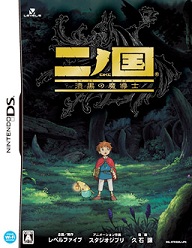Stella Deus
PlayStation 2
Reviewed: 05/03/2005
 |
The Tactical RPG sub-genre has seen quite a bit of growth in these last few years. However, many of the TRPGs on PlayStation 2 have recently begun to feel generic and too much alike. Atlus has delivered a welcome change of pace with Stella Deus.
Upon first look, Stella might just look like another TRPG. Once playing it, though, players will find that this game is pleasantly different, while remaining familiar enough that TRPG vets will be right at home. This is thanks to the fresh battle system. If there’s any singular reason to play Stella Deus, it’s the fun battles. The battles here are similar in format to games like Hoshigami (but done right) because of the AP system. Characters start a turn with 100 AP. Moving costs a certain amount per space, and other actions like spells, items use, and attacking have different costs, depending on the character and other factors. This means that if the players don’t want to move a character, they can stand in place and attack 2 or 3 times. Or perhaps they’ll use a curing item, then attack someone, then move 1 space. Additionally, the amount of AP someone has at the end of the turn is a factor in determining how soon his/her next turn will come. Position certain characters correctly, and you can perform a “team attack” instead of a regular attack. All of this means there are several options for each character’s turn. The battles are a blast.
 |
| The grid-based fighting you love, done with a system you’ll love even more. |
The character growth system is fairly well done. Each character is in an unchangeable job class like “Archer” or “Cleric,” and given a certain set of skills he/she can learn. After each attack, spell, or item use, characters gain EXP as well as “SP.” These SP function much like they do in Xenosaga: Episode I, as they can be used to raise numerical stats, or be used to learn new skills. Additionally, players can have a good time fusing items together as well. The in-game alchemy can prove useful to those who use it wisely.
What’s kind of a downer is that it doesn’t feel like there’s enough customization available. In many Tactical RPGs, there is a feeling of excitement that follows every battle, because the player knows that there is some customizable growth about to happen. However, when looking over proper things on which to spend SP after a battle in Stella Deus, there will be many times when the player sees nothing worth doing. It’s like the idea of character progress is sometimes more of a tease than a reality. The fact that the growth doesn’t go very deep doesn’t help either. On the upside, this lack of depth makes Stella Deus a safe choice for someone who is playing his/her first TRPG because no one will be overwhelemed by options, side tasks, and decisions.
 |
| Sometimes, story segments are told by a background shot and some talking. If you’re lucky, you’ll get to see the speaker. |
A complaint that isn’t so minor would be directed at the slow-moving story. Not slow like the plot takes too long to unfold–that part is fine–I mean slow like, how the scenes are presented. You’ll see a still picture of a character on the screen, hit X, then wait for him to fade out…then the next person fades in…and fades out…and someone else fades in…and so on. This is not a problem solvable by skipping the voice acting. The problem lies in the fading in and fading out…it’s brief, but it’s still an unnecessary pause. The story being told is only standard grade to begin with (see the preview for more info), but the poor presentation makes it worse. Over time, it gets more and more aggravating.
The audio suffers. The sound effects are fine, the music is pleasant, but those voices…oh, the voices. Don’t play this in the same room as any non-RPG-playing friends who won’t understand, because if you do, you’ll be embarrassed when they hear these voices coming from the game you’ve chosen to play.
 |
| Fighting in the Catacombs is fun and rewarding |
Continuing with complaints comes the “Quests.” Just like many other TRPGs, a special side-mission can be taken at a certain place in the towns. The good quests result in interesting battles, neat bits of side-story, and perhaps even a new character recruited to the team. But these quests make up the minority. Too many quests are shallow and involve the player doing nothing. For example, if you take a quest about helping someone build a rocket to the moon you might see a black screen with text saying “Wow, thanks for the help. Here’s your reward.” Then you get money for doing absolutely nothing. Nothing. All the player did was read two lines of text. This would be fine if it only happened once or twice, but there’s a startlingly high number of quests that don’t involve any action at all by the player.
But when it comes down to it, the addictive and fun gameplay can overpower these flaws. The catacombs are a great addition to the game that allow the player to practice their tactics, experiment with new strategies, and gain SP. One could say that the catacombs are even a highlight of the game. The fact that they are available in the basement of every town is also a nice touch.
Stella Deus is a good game. One last good point about it would be the originality; there aren’t any other games on PS2 that feel like this one, which is definitely a good thing. It’s a wonderful diversion from the competition, that’s for sure. Tactical RPG fans will dig it, but they shouldn’t expect it to be flawless.
-Eric Emerson
| Score Breakdown | ||
| Overall Good Out of 10 See our Review Criteria |
Gameplay | Great |
| Story | Below Average | |
| Graphics | Very Good | |
| Sound/Music | Below Average | |
| Replay Value | Average | |
| The Verdict: 6 | ||








